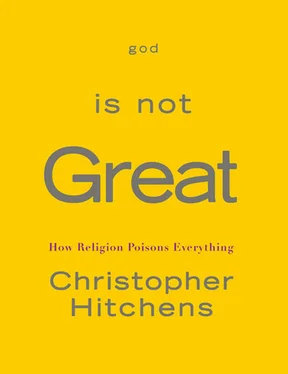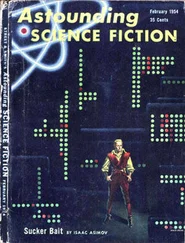The suspicion that a calamity might also be a punishment is further useful in that it allows an infinity of speculation. After New Orleans, which suffered from a lethal combination of being built below sea level and neglected by the Bush administration, I learned from a senior rabbi in Israel that it was revenge for the evacuation of Jewish settlers from the Gaza Strip, and from the mayor of New Orleans (who had not performed his own job with exceptional prowess) that it was god’s verdict on the invasion of Iraq. You can nominate your own favorite sin here, as did the “reverends” Pat Robertson and Jerry Falwell after the immolation of the World Trade Center. In that instance, the proximate cause was to be sought and found in America’s surrender to homosexuality and abortion. (Some ancient Egyptians believed that sodomy was the cause of earthquakes: I expect this interpretation to revive with especial force when the San Andreas Fault next gives a shudder under the Gomorrah of San Francisco.) When the debris had eventually settled on Ground Zero, it was found that two pieces of mangled girder still stood in the shape of a cross, and much wondering comment resulted. Since all architecture has always involved crossbeams, it would be surprising only if such a feature did not emerge. I admit that I would have been impressed if the wreckage had formed itself into a Star of David or a star and crescent, but there is no record of this ever having occurred anywhere, even in places where local people might be impressed by it. And remember, miracles are supposed to occur at the behest of a being who is omnipotent as well as omniscient and omnipresent. One might hope for more magnificent performances than ever seem to occur.
The “evidence” for faith, then, seems to leave faith looking even weaker than it would if it stood, alone and unsupported, all by itself. What can be asserted without evidence can also be dismissed without evidence. This is even more true when the “evidence” eventually offered is so shoddy and self-interested.
THE “ARGUMENT FROM AUTHORITY” is the weakest of all arguments. It is weak when it is asserted at second or third hand (“the Good Book says”), and it is even weaker when asserted at first hand, as every child knows who has heard a parent say “because I say so” (and as every parent knows who has heard himself reduced to uttering words he once found so unconvincing). Nonetheless, it takes a certain “leap” of another kind to find oneself asserting that all religion is made up by ordinary mammals and has no secret or mystery to it. Behind the veil of Oz, there is nothing but bluff. Can this really be true? As one who has always been impressed by the weight of history and culture, I do keep asking myself this question. Was it all in vain, then: the great struggle of the theologians and scholars, and the stupendous efforts of painters and architects and musicians to create something lasting and marvelous that would testify to the glory of god?
Not at all. It does not matter to me whether Homer was one person or many, or whether Shakespeare was a secret Catholic or a closet agnostic. I should not feel my own world destroyed if the greatest writer about love and tragedy and comedy and morals was finally revealed to have been the Earl of Oxford all along, though I must add that sole authorship is important to me and I would be saddened and diminished to learn that Bacon had been the man. Shakespeare has much more moral salience than the Talmud or the Koran or any account of the fearful squabbles of Iron Age tribes. But there is a great deal to be learned and appreciated from the scrutiny of religion, and one often finds oneself standing atop the shoulders of distinguished writers and thinkers who were certainly one’s intellectual and sometimes even one’s moral superiors. Many of them, in their own time, had ripped away the disguise of idolatry and paganism, and even risked martyrdom for the sake of disputes with their own coreligionists. However, a moment in history has now arrived when even a pygmy such as myself can claim to know more—through no merit of his own—and to see that the final ripping of the whole disguise is overdue. Between them, the sciences of textual criticism, archaeology, physics, and molecular biology have shown religious myths to be false and man-made and have also succeeded in evolving better and more enlightened explanations. The loss of faith can be compensated by the newer and finer wonders that we have before us, as well as by immersion in the near-miraculous work of Homer and Shakespeare and Milton and Tolstoy and Proust, all of which was also “man-made” (though one sometimes wonders, as in the case of Mozart). I can say this as one whose own secular faith has been shaken and discarded, not without pain.
When I was a Marxist, I did not hold my opinions as a matter of faith but I did have the conviction that a sort of unified field theory might have been discovered. The concept of historical and dialectical materialism was not an absolute and it did not have any supernatural element, but it did have its messianic element in the idea that an ultimate moment might arrive, and it most certainly had its martyrs and saints and doctrinaires and (after a while) its mutually excommunicating rival papacies. It also had its schisms and inquisitions and heresy hunts. I was a member of a dissident sect that admired Rosa Luxemburg and Leon Trotsky, and I can say definitely that we also had our prophets. Rosa Luxemburg seemed almost like a combination of Cassandra and Jeremiah when she thundered about the consequences of the First World War, and the great three-volume biography of Leon Trotsky by Isaac Deutscher was actually entitled The Prophet (in his three stages of being armed, unarmed, and outcast). As a young man Deutscher had been trained for the rabbinate, and would have made a brilliant Talmudist—as would Trotsky. Here is what Trotsky says—anticipating the gnostic Gospel of Judas—about the way that Stalin took over the Bolshevik Party:
Of Christ’s twelve Apostles Judas alone proved to be traitor. But if he had acquired power, he would have represented the other eleven Apostles as traitors, and also all the lesser Apostles whom Luke numbers as seventy.
And here, in Deutscher’s chilling words, is what happened when the pro-Nazi forces in Norway forced the government to deny Trotsky asylum and deport him once again, to wander the world until he met death. The old man met with the Norwegian foreign minister Trygve Lie and others, and then:
Trotsky raised his voice so that it resounded through the halls and corridors of the Ministry: “This is your first act of surrender to Nazism in your own country. You will pay for this. You think yourselves free and secure to deal with a political exile as you please. But the day is near—remember this!—the day is near when the Nazis will drive you from your country, all of you… ” Trygve Lie shrugged at this odd piece of sooth-saying. Yet after less than four years the same government had indeed to flee from Norway before the Nazi invasion; and as the Ministers and their aged King Haakon stood on the coast, huddled together and waiting anxiously for a boat that was to take them to England, they recalled with awe Trotsky’s words as a prophet’s curse come true.
Trotsky had a sound materialist critique that enabled him to be prescient, not all of the time by any means, but impressively so on some occasions. And he certainly had a sense—expressed in his emotional essay Literature and Revolution —of the unquenchable yearning of the poor and oppressed to rise above the strictly material world and to achieve something transcendent. For a good part of my life, I had a share in this idea that I have not yet quite abandoned. But there came a time when I could not protect myself, and indeed did not wish to protect myself, from the onslaught of reality. Marxism, I conceded, had its intellectual and philosophical and ethical glories, but they were in the past. Something of the heroic period might perhaps be retained, but the fact had to be faced: there was no longer any guide to the future. In addition, the very concept of a total solution had led to the most appalling human sacrifices, and to the invention of excuses for them. Those of us who had sought a rational alternative to religion had reached a terminus that was comparably dogmatic. What else was to be expected of something that was produced by the close cousins of chimpanzees? Infallibility? Thus, dear reader, if you have come this far and found your own faith undermined—as I hope—I am willing to say that to some extent I know what you are going through. There are days when I miss my old convictions as if they were an amputated limb. But in general I feel better, and no less radical, and you will feel better too, I guarantee, once you leave hold of the doctrinaire and allow your chainless mind to do its own thinking.
Читать дальше












